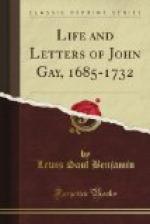In 1716 Gay paid a second visit to Devonshire, and during the year he composed the “sober eclogue,” “The Espousal,” which probably arose out of a suggestion of Swift. “There is an ingenious Quaker[7] in this town, who writes verses to his mistress, not very correct, but in a strain purely what a poetical Quaker should do, commending her looks and habit, etc.” Swift wrote to Pope on August 30th, 1716: “It gave me a hint that a set of Quaker pastorals might succeed if our friend Gay could fancy it, and I think it a fruitful subject. Pray hear what he says. I believe farther, the pastoral ridicule is not exhausted, and that a porter, footman, or chairman’s pastoral might do well; or what think you of a Newgate pastoral, among the whores and thieves there?"[8] This letter is of especial importance in the biography of Gay, as it may well have sown in his mind the seed of “The Beggar’s Opera.”
About this time Gay was labouring on another play, “Three Hours After Marriage,” which he wrote in collaboration with Pope and Arbuthnot. It is a sorry piece of work, and unworthy of any one, much less of the three distinguished men associated in the authorship. In the Epilogue it is written:—
Join then your voices, be the play excused
For once, though no one living is abused;
but as a matter of fact one purpose of the play was, as Dr. Johnson said, “to bring into contempt Dr. Woodward, the fossilist, a man not really or justly contemptible.” Woodward was the author of a “History of Fossils,” and his name survives in the Woodwardian Professorship of Geology at Cambridge. He was introduced as Dr. Cornelius in “Martin Scriblerus":—
Who nature’s treasures would explore,
Her mysteries and arcana
know.
Must high as lofty Newton soar,
Must stoop as delving
Woodward low.
The bridegroom in the play is called Fossile, and there was no mistaking the intention. Dr. Woodward had many friends, and these made known their disgust in the most unmistakable manner when “Three Hours After Marriage” was produced on January 16th, 1717, at Drury Lane Theatre. It ran for seven nights. “It had the fate which such outrages deserved,” Dr. Johnson has written; “the scene in which Woodward was directly and apparently ridiculed by the introduction of a mummy and a crocodile, disgusted the audience, and the performance was driven off the stage with general condemnation."[9] The farce was not only dull, it was vulgar. And the geologist (played by Johnson) was not the only person introduced for the purpose of ridicule. Dennis was brought in as Sir Tremendous, and it was believed that Phoebe Clinket (played by Mrs. Bicknell) was intended for Anne Finch, Countess of Winchelsea, who, says Mr. Austin Dobson, “was alleged to have spoken contemptuously of Gay.” Of this farce, Mr. Dobson writes: “It is perhaps fairer to say that he bore the blame, than that he is justly charged with its errors




